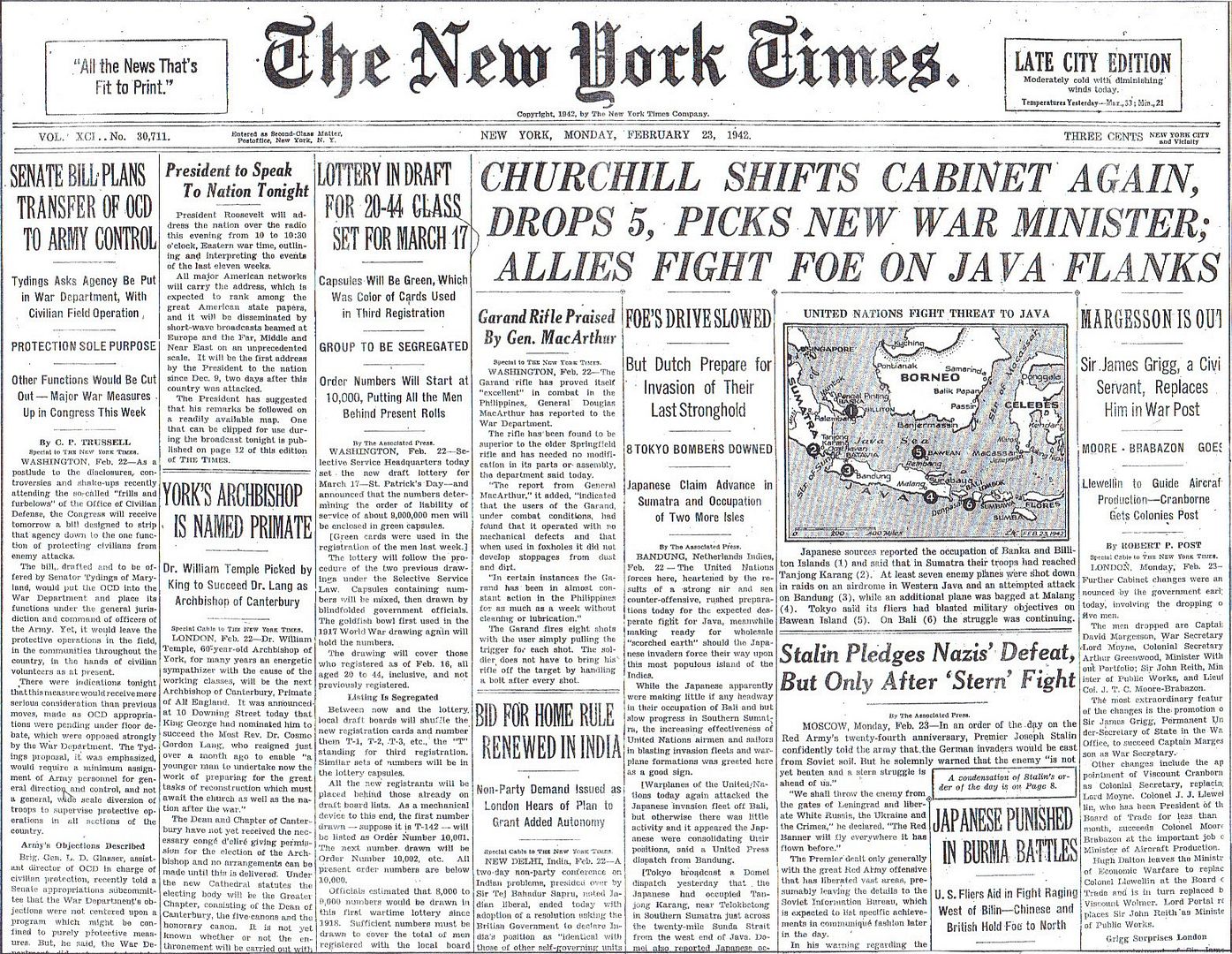
Posted on 02/23/2012 4:14:26 AM PST by Homer_J_Simpson

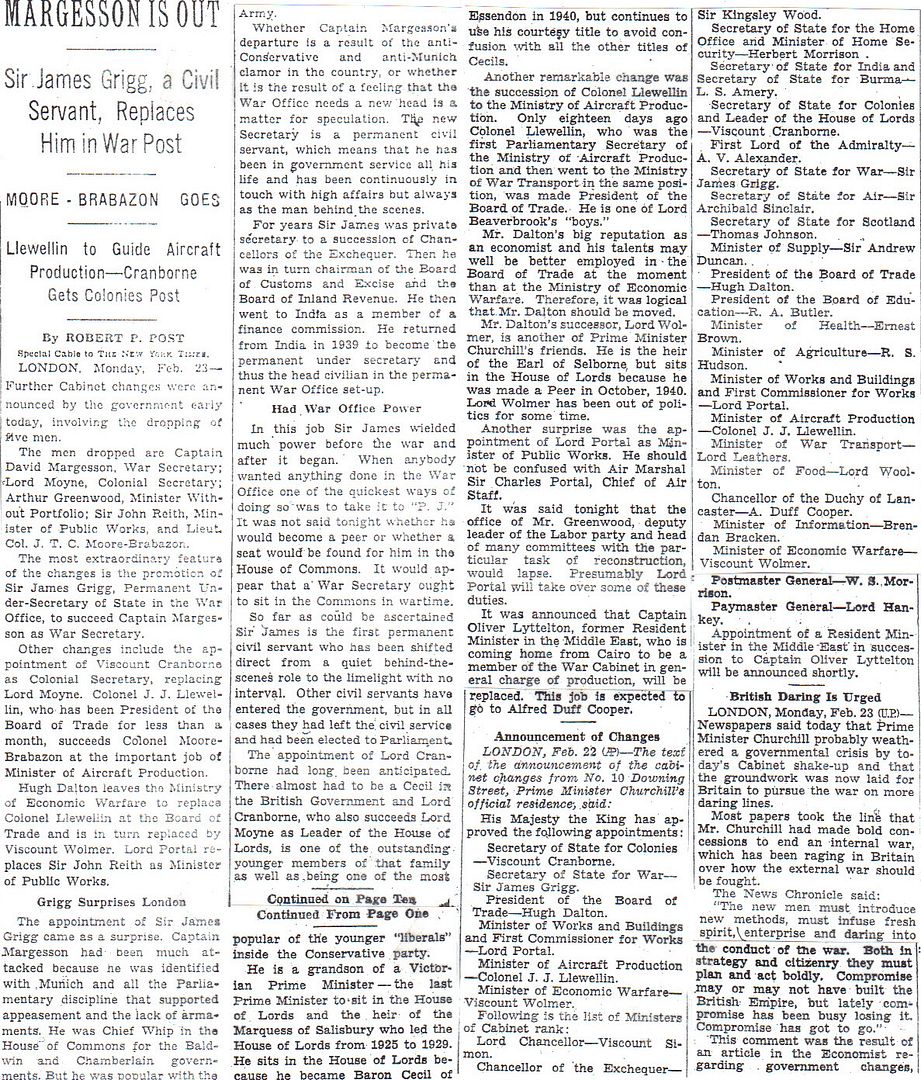
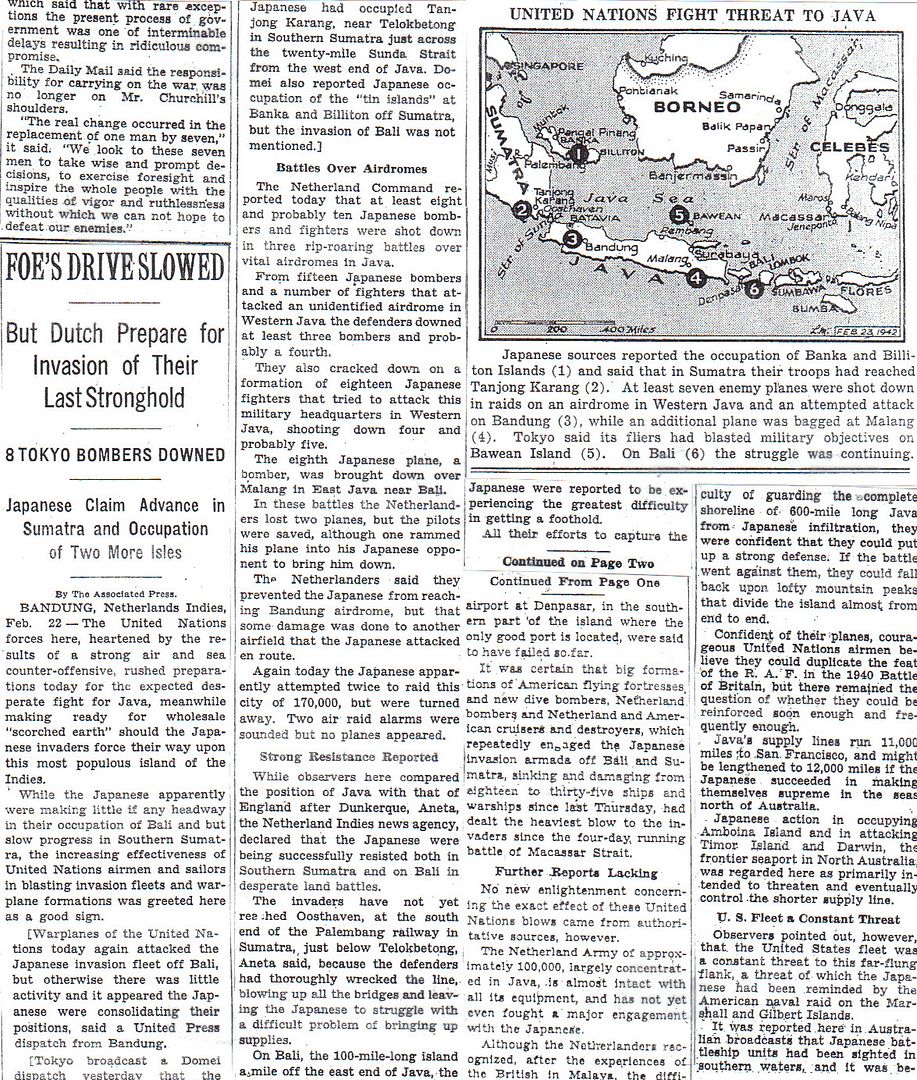
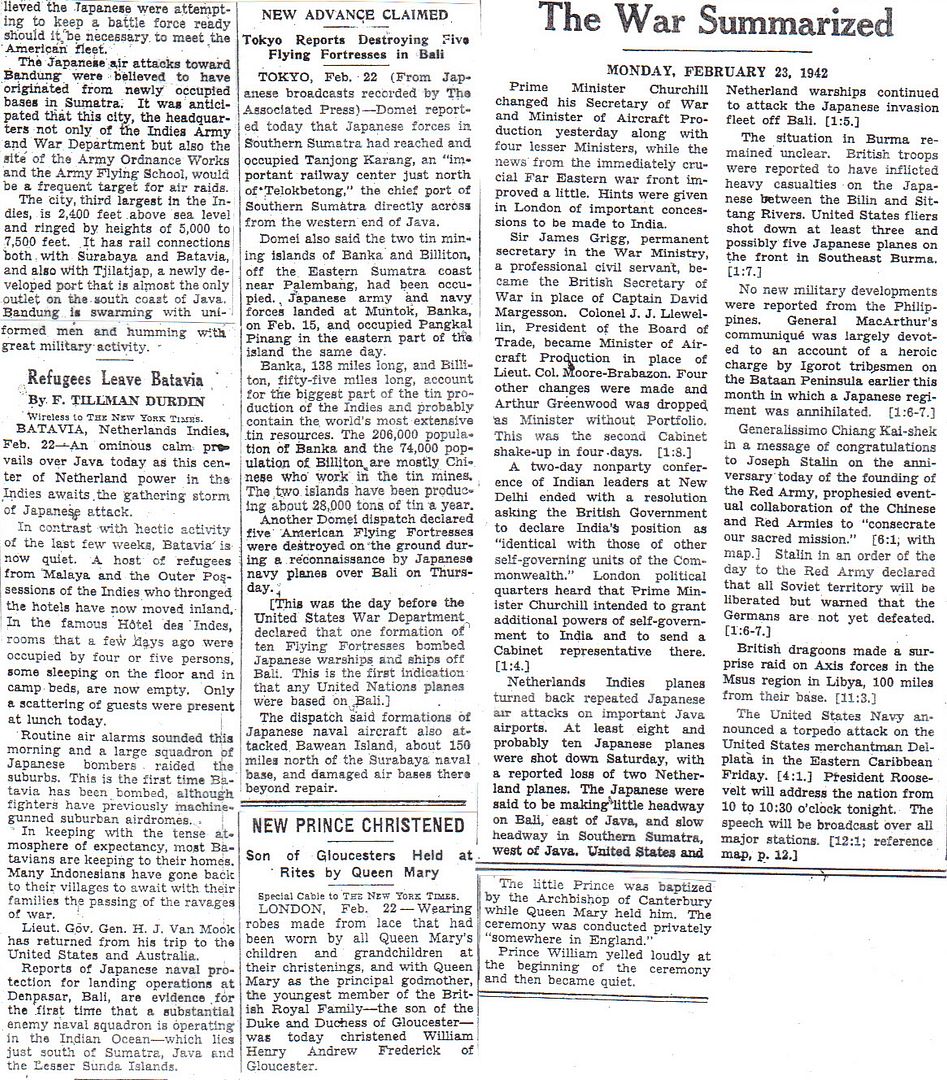
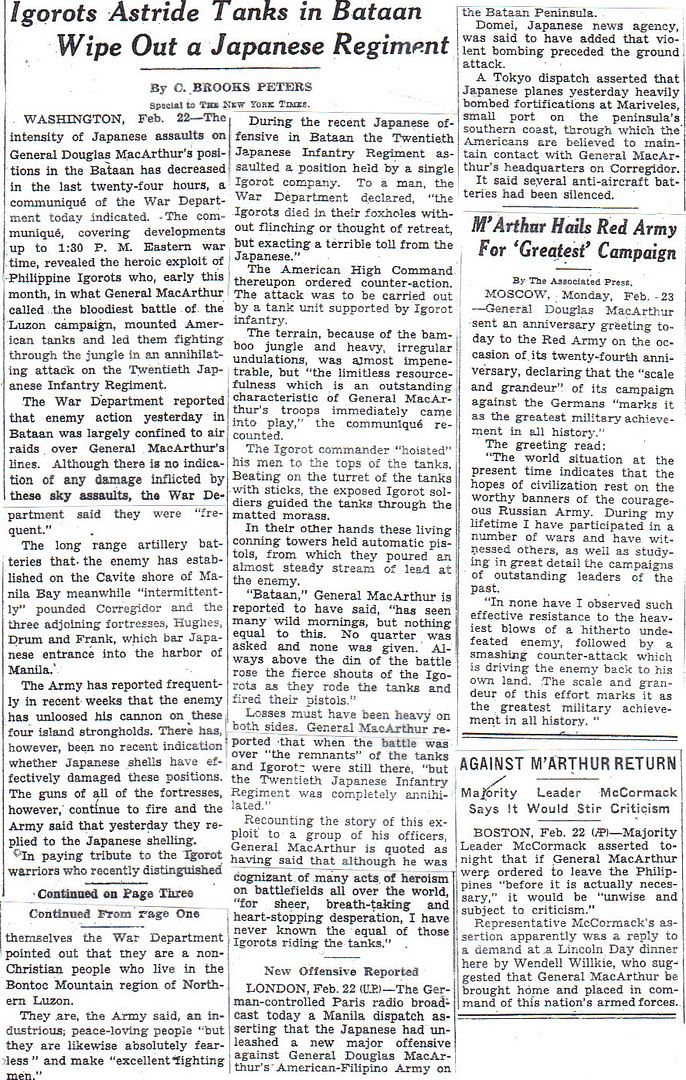
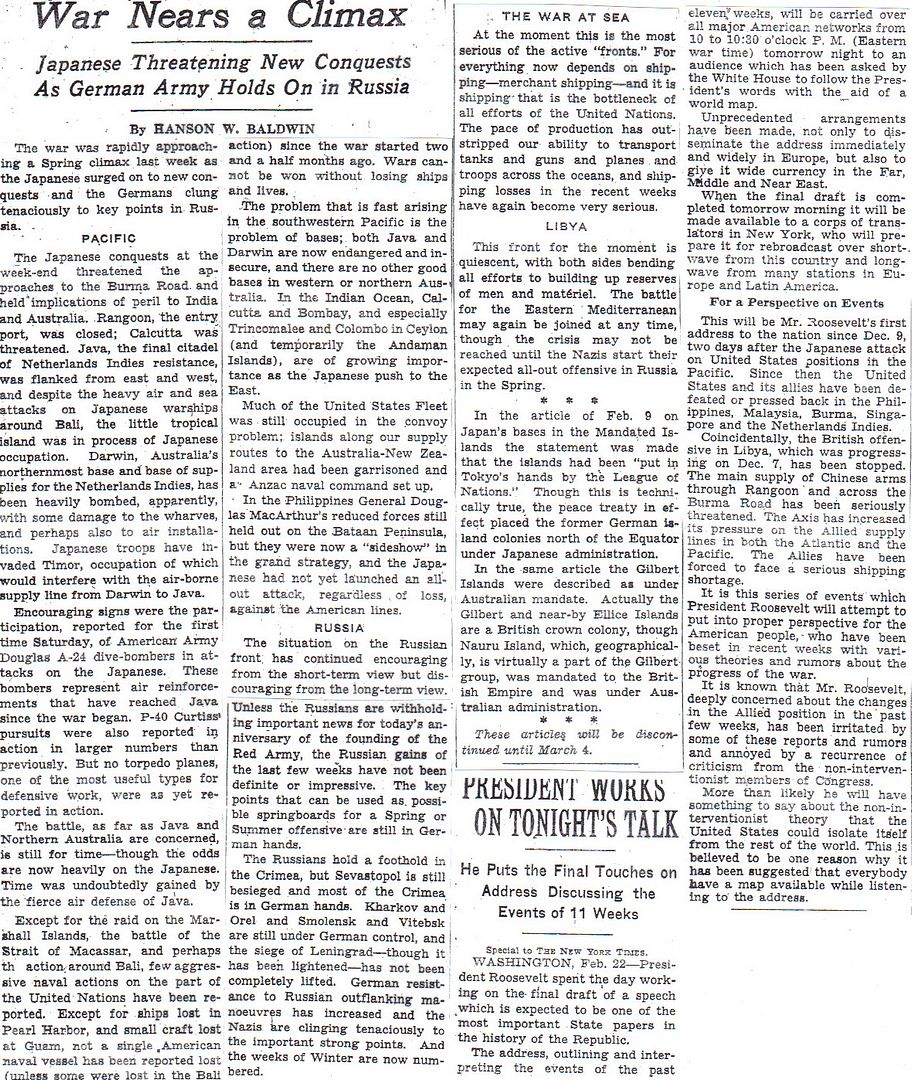
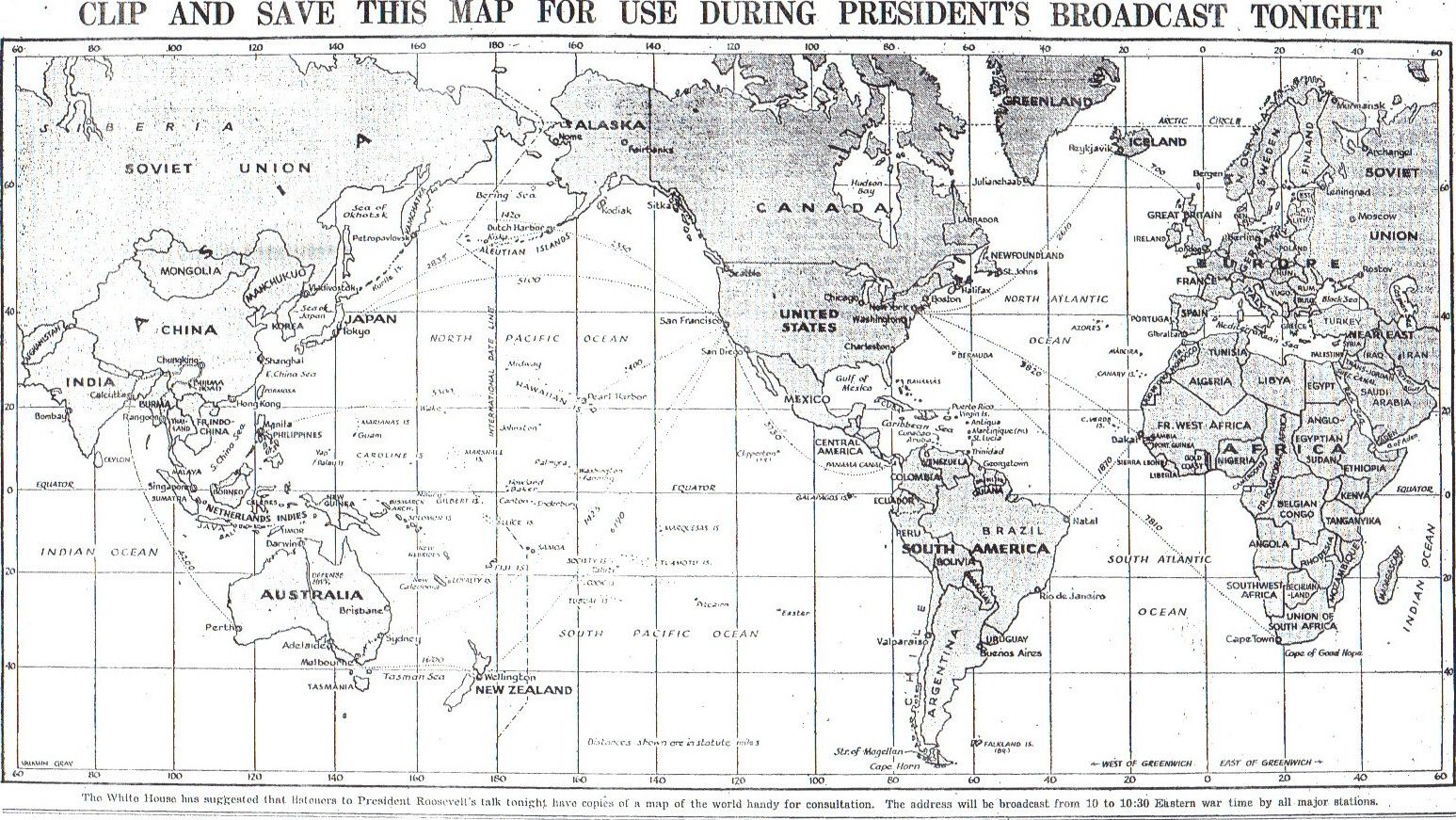
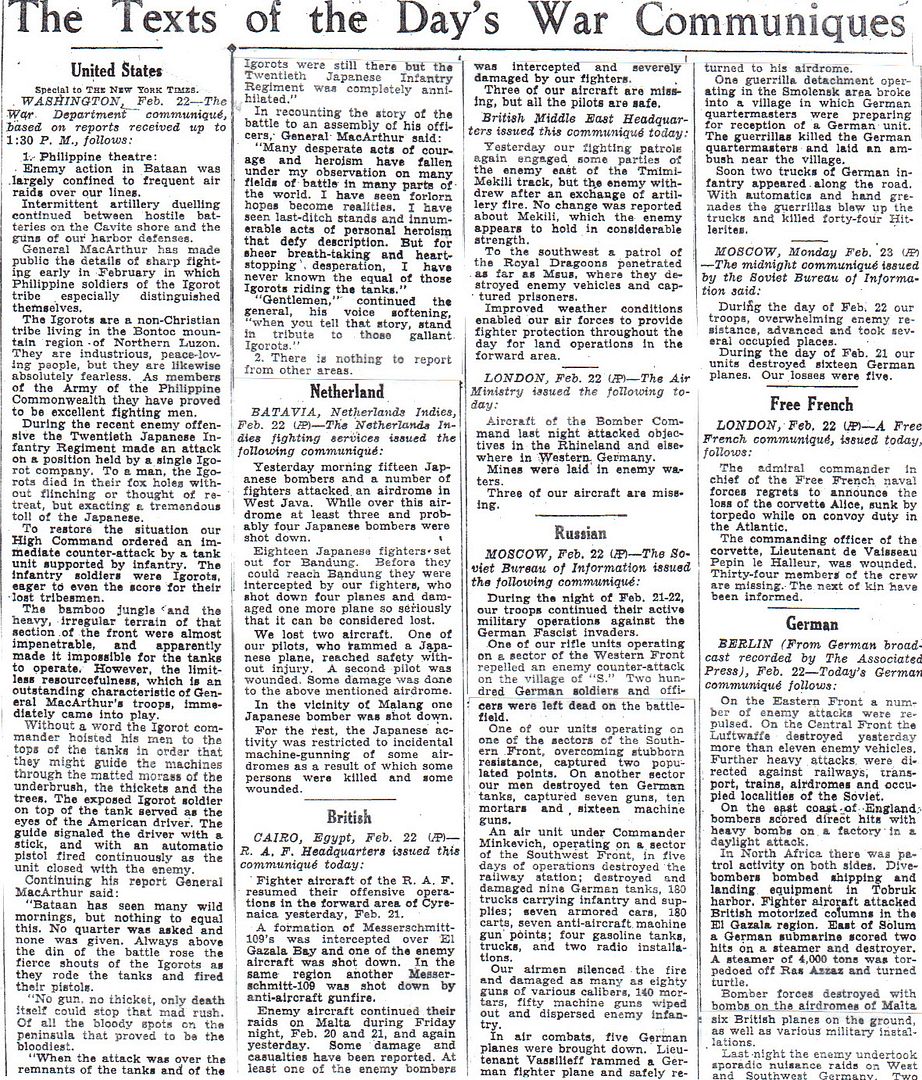
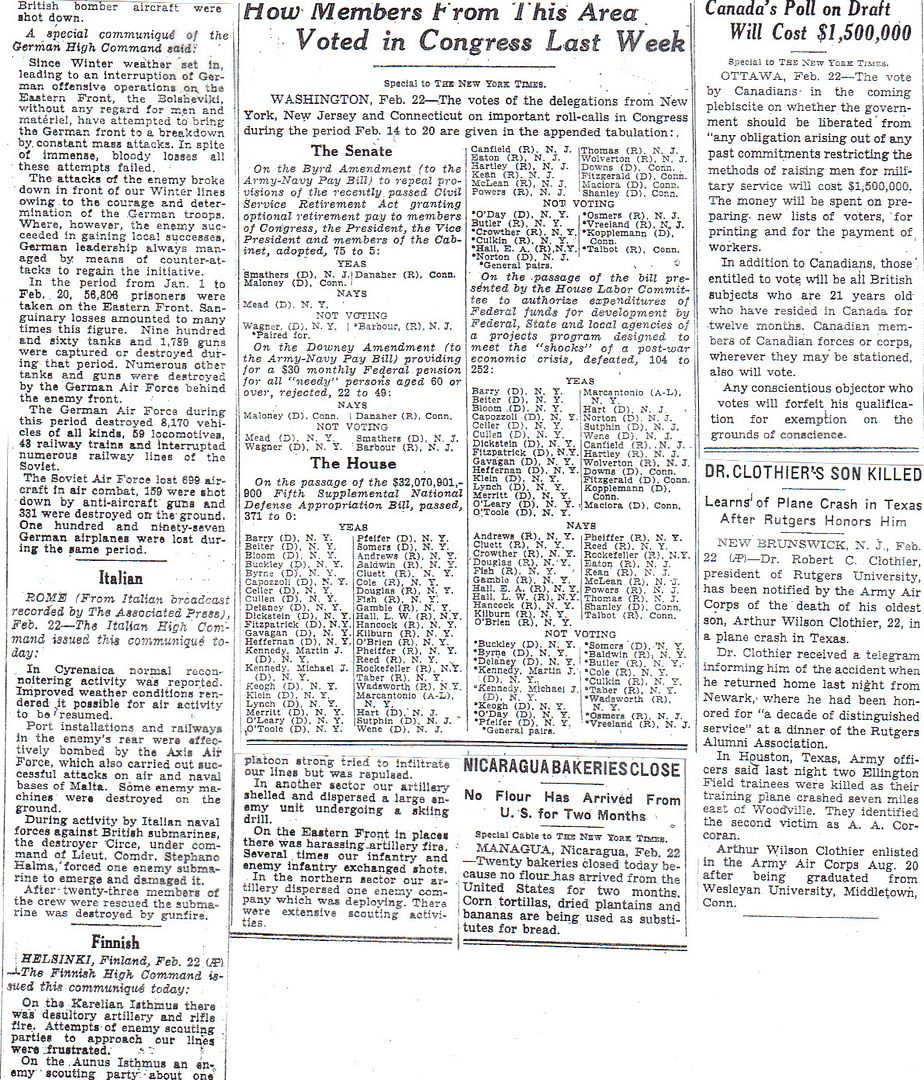
* Gather around your radios tonight at 10:00 P.M. Eastern War Time. We will be broadcasting the President’s speech live beginning at that time, give or take 70 years.
http://www.onwar.com/chrono/1942/feb42/f23feb42.htm
Japanese attack traps British division
Monday, February 23, 1942 www.onwar.com
Japanese tanks in BurmaIn Burma... A large part of the British 17th Indian Division is trapped on the east bank of the Sittang River when the only accessible bridge is destroyed. Most of the troops escape to the other side of the river, but all of their heavy equipment is lost.
http://homepage.ntlworld.com/andrew.etherington/month/thismonth/23.htm
February 23rd, 1942
UNITED KINGDOM: Prime Minister Winston Churchill informs Australian Prime Minister John Curtin that the convoy carrying the Australian 6th and 7th Divisions will proceed to Australian after refuelling at Colombo, Ceylon. (Jack McKillop)
HQ of the USAAF’s VIII Bomber Command is established at Daws Hill Lodge, High Wycombe, Buckinghamshire, England; Major General Ira C Eaker assumes command. (Jack McKillop)
Minesweeper HMS Rattlesnake launched.
Corvette HMS Godetia commissioned. (Dave Shirlaw)
NORTH SEA: Submarine HMS Trident (Cmdr. Sladen) sights KMS Prinz Eugen and fires three torpedoes, one of which hits aft, damaging Prinz Eugen’s rudder and blowing away 30 feet of her stern. She is taken into Lo Fjord at Drontheim, and temporary repairs (including the fitting of two jury rudders) is completed by the beginning of May (1942). (Alex Gordon)
FRANCE: Paris: Stülpnagel has a farewell tea in the Paris Talleyrand with Ernst Jünger. Jünger describes him “In him, delicacy, grace, suppleness, are oddly mixed, suggesting a ballet master, with features like wooden guignol, melancholy and maniacal. He had sent for about the question of hostages, because he was most concerned that the record in the future be accurate. Beside, the question is the only one which has to do with his departure. Seen from the outside, he displays the grand proconsular power of someone in his position, and there is no way of learning the secret history of the quarrels and intrigues within the palace walls. The story is filled out with the struggle against the embassy and the Nazi party in France, the latter slowly gaining ground, without the Army High Command lending its support to the general.” Stülpnagel goes on to say that the campaign in Russia is taking an unexpected turn and he considered that Germany’s tactical interests lay in securing its empire with the minimum of force. (1)
GERMANY: During the night of the 23-24th RAF Bomber Command dispatches 23 Hampdens on minelaying mission off Wilhelmshaven and Heligoland. One aircraft lost. (Jack McKillop)
U-955 laid down.
U-410 commissioned. (Dave Shirlaw)
U.S.S.R.: Soviet troops capture Dorogobuzh on the Dniepr River. German reports that day say that a partisan camp of more than 500 men armed with heavy machine guns and anti-tank guns, is located east of Minsk. In the Cherven region, partisans “have strict orders not to start any action, only to attack and destroy German search parties.” (Jack McKillop)
ITALY: Italian dictator Benito Mussolini delivers a speech in Rome stating, “We call bread bread and wine wine, and when the enemy wins a battle it is useless and ridiculous to seek, as the English do in their incomparable hypocrisy, to deny or diminish it.” (Jack McKillop)
MEDITERRANEAN SEA: U class submarine P.38 is depth charged and sunk by Italian surface units North of Tripoli. Submarine HMS P-38 left Malta on 16 February 1942 to intercept a convoy off Tripoli. By today she is in position as the convoy hove into view. Amongst the convoy was the Italian torpedo boat Circe. At 0800 Circe reported a contact with a submarine and that she turned in to attack. A periscope was sighted but was quickly replaced by bubbles as the submarine dived realizing it had been spotted. At 1050 after a flurry of attacks P-38 rose stern first out of the water, her propellers turning wildly, before crashing back beneath the waves. A large patch of oil appeared on the surface as well as debris, clear evidence of the submarine’s destruction. (Alex Gordon)(108)
MIDDLE EAST: General Claude Auchinleck, Commander in Chief Middle East Command, revises the plans for defence of the Northern Front, instructing the British Ninth and Tenth Armies to impose maximum delay on the enemy in the event of Axis offensive. (Jack McKillop)
BURMA: Rangoon: The demolition today of a key bridge across the broad Sittang river in southern Burma has resulted in heavy loss to the 17th Indian Division which was fighting against Japanese troops advancing towards Rangoon.
Unfortunately, Japanese intelligence overheard the radioed order to withdraw and moved swiftly cross-country to the bridge.
The 17th Division held its ground at the bridge as engineers prepared to destroy the only escape route. If the Japanese should capture the bridge, Rangoon would be at their mercy.
The charges were detonated at dawn (0530 hours), cutting off the British and Indian troops of the 16th and 46th Brigades on the east side of the river, but preventing the Japanese from using it. All who could be spared from fighting off the Japanese began improvising rafts. Amid chaos and confusion, hundreds of men threw away their arms, equipment and clothing and plunged into the river which became a mass of bobbing heads. Many were swept away and drowned. The battle of the Sittang bridgehead is disastrous for the Indian 17th Division; they can only muster 80 officers and 3,404 enlisted men, of whom only 1,420 still have their rifles and the 46th Brigade must be broken up to provide replacements. In Rangoon, British authorities move to push supplies up to China or destroy them on the spot to prevent the Japanese from seizing them. Exploding fuel tanks and ammunition dumps tell yet another story of Allied failure against the Japanese. The British send the 7th Armoured Brigade to Rangoon to try and restore the situation. (Jack McKillop)
NETHERLANDS EAST INDIES: The Japanese report that the conquest of Ambon Island is complete. (Jack McKillop)
On Dutch West Timor, the Australian 2/40th Battalion surrenders to the Japanese after four days of fighting. The battalion had run out of food and water and 132 men were ill or seriously wounded. (Jack McKillop)
On Portuguese East Timor, the Australian 2/2 Independent Company begins to reorganize and deploy as a guerrilla force. This guerrilla warfare continued until January 1943. (Jack McKillop)
On Java, Allied forces begin an evacuation of the island. Major General George H. Brett, deputy commander of the ABDA Command, flies from Java, which is in imminent danger, to Darwin, Northern Territory, Australia. (Jack McKillop)
AUSTRALIA: Major General Lewis H Brereton, Commanding General USAAF 5th Air Force, departs for India after issuing an order terminating HQ 5th Air Force. Until 3 September 1942, units of the 5th Air Force will be initially under control of the American-British-Dutch-Australian (ABDA) Command and later the Allied Air Forces. (Jack McKillop)
BISMARCK ARCHIPELAGO: Six USAAF B-17 Flying Fortress fly their first mission against Rabaul on New Britain Island. Operating out of Townsville, Queensland, Australia, the force suffers mechanical trouble and runs into bad weather and only one B-17 manages to bomb the target. After this mission, the 12 B-17s at Townsville are placed under the operational control of the RAAF. (Jack McKillop)
U.S.A.: Shells fall on the US mainland for the first time in the war. Japanese submarine HIJMS I-17 fires 25 rounds of 5.5-inch (14 cm) shells from a range of 2,500 yards (2286 meters) at the Bankline Oil Refinery at Ellwood, California, 12 miles (19 kilometres) west of Santa Barbara. One shell makes a direct hit of the rigging causing minor damage. (Jack McKillop)
President Franklin D. Roosevelt was giving a fireside radio chat to the nation at the time of the attack above; the purpose was to calm fears that the attack on Pearl Harbor has left the country defenseless. Quoting Revolutionary War firebrand Thomas Paine, he says “these are the times that try men’s souls,” and adds “tyranny, like hell is not easily conquered.” (Jack McKillop)
(From President Roosevelt’s February 23rd fireside chat):
“Immediately after this war started, the Japanese forces moved down on either side of the Philippines to numerous points south of them — thereby completely encircling the (Islands) Philippines from north, and south, and east and west.
“It is that complete encirclement, with control of the air by Japanese land-based aircraft, which has prevented us from sending substantial reinforcements of men and material to the gallant defenders of the Philippines. For forty years it has always been our strategy — a strategy born of necessity — that in the event of a full-scale attack on the Islands by Japan, we should fight a delaying action, attempting to retire slowly into Bataan Peninsula and Corregidor.
“We knew that the war as a whole would have to be fought and won by a process of attrition against Japan itself. We knew all along that, with our greater resources, we could ultimately out-build Japan and ultimately overwhelm her on sea, and on land and in the air. We knew that, to obtain our objective, many varieties of operations would be necessary in areas other than the Philippines.
“Now nothing that has occurred in the past two months has caused us to revise this basic strategy of necessity — except that the defence put up by General MacArthur has magnificently exceeded the previous estimates of endurance, and he and his men are gaining eternal glory therefore.
“MacArthur’s army of Filipinos and Americans, and the forces of the United Nations in China, in Burma and the Netherlands East Indies, are all together fulfilling the same essential task. They are making Japan pay an increasingly terrible price for her ambitious attempts to seize control of the whole (Atlantic) Asiatic world. Every Japanese transport sunk off Java is one less transport that they can use to carry reinforcements to their army opposing General MacArthur in Luzon.
“It has been said that Japanese gains in the Philippines were made possible only by the success of their surprise attack on Pearl Harbor. I tell you that this is not so.
“Even if the attack had not been made your map will show that it would have been a hopeless operation for us to send the Fleet to the Philippines through thousands of miles of ocean, while all those island bases were under the sole control of the Japanese.
“The consequences of the attack on Pearl Harbor — serious as they were — have been wildly exaggerated in other ways. And these exaggerations come originally from Axis propagandists; but they have been repeated, I regret to say, by Americans in and out of public life.”
(Tim Lanzendörfer)
Three days ago, the Combined Chiefs of Staff (CCS) announced that no Allied forces would be evacuated from Java. Today, the CCS orders General Sir Archibald Wavell, Command in Chief ABDA Command, to move his headquarters from Java to Australia. (Jack McKillop)
A Master Mutual Aid Agreement is signed between Australia, New Zealand, the U.K. and the U.S. (Jack McKillop)
The USN’s Bureau of Aeronautics outlines a comprehensive program which became the basis for the wartime expansion of pilot training. In place of the existing seven months course, the new program required 11 months for pilots of single or twin-engine aircraft and 12 months for four-engine pilots, and is divided into three months at Induction Centers, three months in Primary, three months in Intermediate and two or three months in Operational Training, depending on the type aircraft used. (Jack McKillop)
Destroyer USS Converse laid down. (Dave Shirlaw)
CARIBBEAN SEA: At 0643, the unescorted armed US merchant ship SS Lihue was torpedoed by U-161 about 275 miles west of Martinique. One torpedo struck on the port side forward of the #1 hold. About 15 minutes later, the U-boat surfaced and fired a few shots from its deck gun until the armed guards returned fire with her armament of one 3in, four .50cal and two .30cal guns, forcing the U-boat to submerge. The ship then evaded two torpedoes at 1839 and 1854; the U-boat ceased the attack, because U-161 thought that the Lihue was a U-boat trap. But after the unsuccessful attack in the evening, the crew of eight officers, 28 crewmen and nine armed guards abandoned ship in two lifeboats and three rafts. They were all picked up four hours later by the British steam tanker British Governor, after a US Navy aircraft had directed the ship to the lifeboats. A salvage party from AMC HMCS Prince Henry boarded Lihue in an attempt to save her, but the ship sank on 26 February while being towed to St Lucia by minesweeper USS Partridge
An unarmed tanker Sun is torpedoed by U-502 about 54 miles (87 kilometres) north of Aruba, and although initially abandoned is reboarded. She is ultimately repaired and returned to service; there are no casualties among the 36-man crew. (Jack McKillop)
Motor tanker Thalia torpedoed and sunk by U-502. (Dave Shirlaw)
SS Lennox (1,904 GRT), Canada Steamships Line bulk canaller was sunk in position 09.15N, 058.30W, in the Caribbean off British Guyana by U-129. She was on route from Paramaribo, Dutch Guyana, to Trinidad with a load of bauxite for transshipment. Two men were lost from her crew of 20 men. The merchantman SS Athelril rescued the survivors. (Dave Shirlaw)
ATLANTIC OCEAN: Steam tanker WD Anderson torpedoed and sunk by U-504 at 27.09N, 79.56W. The sole survivor apparently spotted the torpedo coming for the ship, dove into the sea and swam away as the ship exploded behind him. (Dave Shirlaw)
http://www.mhric.org/fdr/chat20.html
ADDRESS OF THE PRESIDENT DELIVERED BY RADIO FROM THE WHITE HOUSE. BROADCAST OVER A NATIONWIDE AND WORLDWIDE RADIO HOOKUP ON THE OCCASION OF THE 210TH ANNIVERSARY OF GEORGE WASHINGTON’S BIRTHDAY. FEBRUARY 23, 1942 AT 10:00 PM , E.W.T.
“MY FELLOW AMERICANS:
Washington’s Birthday is a most appropriate occasion for us to talk with each other about things as they are today and things as we know they shall be in the future. For eight years, General Washington and his Continental Army were faced continually with formidable odds and recurring defeats. Supplies and equipment were lacking. In a sense, every winter was a Valley Forge. Throughout the thirteen states there existed fifth columnists — and selfish men, jealous men, fearful men, who proclaimed that Washington’s cause was hopeless, and that he should ask for a negotiated peace.
Washington’s conduct in those hard times has provided the model for all Americans ever since — a model of moral stamina. He held to his course, as it had been charted in the Declaration of Independence. He and the brave men who served with him knew that no man’s life or fortune was secure without freedom and free institutions.
The present great struggle has taught us increasingly that freedom of person and security of property anywhere in the world depend upon the security of the rights and obligations of liberty and justice everywhere in the world.
This war is a new kind of war. It is different from all other wars of the past, not only in its methods and weapons but also in its geography. It is warfare in terms of every continent, every island, every sea, every air-lane in the world.
That is the reason why I have asked you to take out and spread before you (the) a map of the whole earth, and to follow with me in the references which I shall make to the world-encircling battle lines of this war. Many questions will, I fear, remain unanswered tonight, but I know you will realize that I cannot cover everything in any one short report to the people. The broad oceans which have been heralded in the past as our protection from attack have become endless battlefields on which we are constantly being challenged by our enemies.
We must all understand and face the hard fact that our job now is to fight at distances which extend all the way around the globe.
We fight at these vast distances because that is where our enemies are. Until our flow of supplies gives us clear superiority we must keep on striking our enemies wherever and whenever we can meet them, even if, for a while, we have to yield ground. Actually, though, we are taking a heavy toll of the enemy every day that goes by.
We must fight at these vast distances to protect our supply lines and our lines of communication with our allies — protect these lines from the enemies who are bending every ounce of their strength, striving against time, to cut them. The object of the Nazis and the Japanese is to of course separate the United States, Britain, China and Russia, and to isolate them one from another, so that each will be surrounded and cut off from sources of supplies and reinforcements. It is the old familiar Axis policy of “divide and conquer.”
There are those who still think, however, in terms of the days of sailing-ships. They advise us to pull our warships and our planes and our merchant ships into our own home waters and concentrate solely on last ditch defense. But let me illustrate what would happen if we followed such foolish advice.
Look at your map. Look at the vast area of China, with its millions of fighting men. Look at the vast area of Russia, with its powerful armies and proven military might. Look at the (British Isles) Islands of Britain, Australia, New Zealand, the Dutch Indies, India, the Near East and the Continent of Africa, with their (re) sources of raw materials — their resources of raw materials, and of peoples determined to resist Axis domination. Look too at North America, Central America and South America. It is obvious what would happen if all of these great reservoirs of power were cut off from each other either by enemy action or by self-imposed isolation:
(1.) First, in such a case, we could no longer send aid of any kind to China — to the brave people who, for nearly five years, have withstood Japanese assault, destroyed hundreds of thousands of Japanese soldiers and vast quantities of Japanese war munitions. It is essential that we help China in her magnificent defense and in her inevitable counteroffensive -for that is one important element in the ultimate defeat of Japan.
(2.) Secondly, if we lost communication with the southwest Pacific, all of that area, including Australia and New Zealand and the Dutch Indies, would fall under Japanese domination. Japan in such a case could (then) release great numbers of ships and men to launch attacks on a large scale against the coasts of the Western Hemisphere — South America and Central America, and North America — including Alaska. At the same time, she could immediately extend her conquests (to) in the other direction toward India, (and) through the Indian Ocean, to Africa, (and) to the Near East and try to join forces with Germany and Italy.
(3.) Third, if we were to stop sending munitions to the British and the Russians in the Mediterranean area, (and) in the Persian Gulf and the Red Sea, (areas) we would be helping the Nazis to overrun Turkey, and Syria, and Iraq, and Persia — that is now called Iran — Egypt and the Suez Canal, the whole coast of North Africa itself and with that inevitably the whole coast of West Africa — putting Germany within easy striking distance of South America — fifteen hundred miles away.
(4.) Fourth, if by such a fatuous policy, we ceased to protect the North Atlantic supply line to Britain and to Russia, we would help to cripple the splendid counter-offensive by Russia against the Nazis, and we would help to deprive Britain of essential food supplies and munitions.
Those Americans who believed that we could live under the illusion of isolationism wanted the American eagle to imitate the tactics of the ostrich. Now, many of those same people, afraid that we may be sticking our necks out, want our national bird to be turned into a turtle. But we prefer to retain the eagle as it is — flying high and striking hard.
I know (that) I speak for the mass of the American people when I say that we reject the turtle policy and will continue increasingly the policy of carrying the war to the enemy in distant lands and distant waters — as far away as possible from our own home grounds.
There are four main lines of communication now being travelled by our ships: the North Atlantic, the South Atlantic, the Indian Ocean and the South Pacific. These routes are not one-way streets, for the ships (which) that carry our troops and munitions out-bound bring back essential raw materials which we require for our own use.
The maintenance of these vital lines is a very tough job. It is a job which requires tremendous daring, tremendous resourcefulness, and, above all, tremendous production of planes and tanks and guns and also of the ships to carry them. And I speak again for the American people when I say that we can and will do that job.
The defense of the world-wide lines of communication demands — compel relatively safe use by us of the sea and of the air along the various routes; and this, in turn, depends upon control by the United Nations of (the) many strategic bases along those routes.
Control of the air involves the simultaneous use of two types of planes — first, the long-range heavy bomber; and, second, the light bombers, the dive bombers, the torpedo planes, (and) the short-range pursuit planes, all of which are essential to (the) cooperate with and protect(ion) (of) the bases and (of) the bombers themselves.
Heavy bombers can fly under their own power from here to the southwest Pacific, either way, but the smaller planes cannot. Therefore, these lighter planes have to be packed in crates and sent on board cargo ships. Look at your map again; and you will see that the route is long — and at many places perilous — either across the South Atlantic all the way (a)round South Africa and the Cape of Good Hope, or from California to the East Indies direct. A vessel can make a round trip by either route in about four months, or only three round trips in a whole year.
In spite of the length, (and) in spite of the difficulties of this transportation, I can tell you that in two and a half months we already have a large number of bombers and pursuit planes, manned by American pilots and crews, which are now in daily contact with the enemy in the Southwest Pacific. And thousands of American troops are today in that area engaged in operations not only in the air but on the ground as well.
In this battle area, Japan has had an obvious initial advantage. For she could fly even her short-range planes to the points of attack by using many stepping stones open to — her bases in a multitude of Pacific islands and also bases on the China coast, Indo-China coast, and in Thailand and Malaya (coasts). Japanese troop transports could go south from Japan and from China through the narrow China Sea, which can be protected by Japanese planes throughout its whole length.
I ask you to look at your maps again, particularly at that portion of the Pacific Ocean lying west of Hawaii. Before this war even started, the Philippine Islands were already surrounded on three sides by Japanese power. On the west, the China side, the Japanese were in possession of the coast of China and the coast of Indo-China which had been yielded to them by the Vichy French. On the North are the islands of Japan themselves, reaching down almost to northern Luzon. On the east, are the Mandated Islands — which Japan had occupied exclusively, and had fortified in absolute violation of her written word.
The islands that lie between Hawaii and the Philippines — these islands, hundreds of them, appear only as small dots on most maps, but do not appear at all. But they cover a large strategic area. Guam lies in the middle of them — a lone outpost which we have never fortified.
Under the Washington Treaty of 1921 we had solemnly agreed not to add to the fortification of the Philippines (Islands). We had no safe naval bases there, so we could not use the islands for extensive naval operations.
Immediately after this war started, the Japanese forces moved down on either side of the Philippines to numerous points south of them — thereby completely encircling the (Islands) Philippines from north, and south, and east and west.
It is that complete encirclement, with control of the air by Japanese land-based aircraft, which has prevented us from sending substantial reinforcements of men and material to the gallant defenders of the Philippines. For forty years it has always been our strategy — a strategy born of necessity — that in the event of a full-scale attack on the Islands by Japan, we should fight a delaying action, attempting to retire slowly into Bataan Peninsula and Corregidor.
We knew that the war as a whole would have to be fought and won by a process of attrition against Japan itself. We knew all along that, with our greater resources, we could ultimately out-build Japan and ultimately overwhelm her on sea, and on land and in the air. We knew that, to obtain our objective, many varieties of operations would be necessary in areas other than the Philippines.
Now nothing that has occurred in the past two months has caused us to revise this basic strategy of necessity — except that the defense put up by General MacArthur has magnificently exceeded the previous estimates of endurance, and he and his men are gaining eternal glory therefore.
MacArthur’s army of Filipinos and Americans, and the forces of the United Nations in China, in Burma and the Netherlands East Indies, are all together fulfilling the same essential task. They are making Japan pay an increasingly terrible price for her ambitious attempts to seize control of the whole (Atlantic) Asiatic world. Every Japanese transport sunk off Java is one less transport that they can use to carry reinforcements to their army opposing General MacArthur in Luzon.
It has been said that Japanese gains in the Philippines were made possible only by the success of their surprise attack on Pearl Harbor. I tell you that this is not so.
Even if the attack had not been made your map will show that it would have been a hopeless operation for us to send the Fleet to the Philippines through thousands of miles of ocean, while all those island bases were under the sole control of the Japanese.
The consequences of the attack on Pearl Harbor — serious as they were — have been wildly exaggerated in other ways. And these exaggerations come originally from Axis propagandists; but they have been repeated, I regret to say, by Americans in and out of public life.
You and I have the utmost contempt for Americans who, since Pearl Harbor, have whispered or announced “off the record” that there was no longer any Pacific Fleet — that the Fleet was all sunk or destroyed on December 7th — that more than (1,000) a thousand of our planes were destroyed on the ground. They have suggested slyly that the Government has withheld the truth about casualties — that eleven or twelve thousand men were killed at Pearl Harbor instead of the figures as officially announced. They have even served the enemy propagandists by spreading the incredible story that ship-loads of bodies of our honored American dead were about to arrive in New York harbor to be put into a common grave.
Almost every Axis broadcast — Berlin, Rome, Tokyo — directly quotes Americans who, by speech or in the press, make damnable misstatements such as these.
The American people realize that in many cases details of military operations cannot be disclosed until we are absolutely certain that the announcement will not give to the enemy military information which he does not already possess.
Your Government has unmistakable confidence in your ability to hear the worst, without flinching or losing heart. You must, in turn, have complete confidence that your Government is keeping nothing from you except information that will help the enemy in his attempt to destroy us. In a democracy there is always a solemn pact of truth between government and the people, but there must also always be a full use of discretion, and that word “discretion” applies to the critics of government as well.
This is war. The American people want to know, and will be told, the general trend of how the war is going. But they do not wish to help the enemy any more than our fighting forces do, and they will pay little attention to the rumor-mongers and the poison peddlers in our midst.
To pass from the realm of rumor and poison to the field of facts: the number of our officers and men killed in the attack on Pearl Harbor on December seventh was 2,340, and the number wounded was 940. Of all of the combatant ships based on Pearl Harbor — battleships, heavy cruisers, light cruisers, aircraft carriers, destroyers and submarines — only three (were) are permanently put out of commission.
Very many of the ships of the Pacific Fleet were not even in Pearl Harbor. Some of those that were there were hit very slightly, and others that were damaged have either rejoined the Fleet by now or are still undergoing repairs. And when those repairs are completed, the ships will be more efficient fighting machines than they were before.
The report that we lost more than a thousand (air)planes at Pearl Harbor is as baseless as the other weird rumors. The Japanese do not know just how many planes they destroyed that day, and I am not going to tell them. But I can say that to date — and including Pearl Harbor — we have destroyed considerably more Japanese planes than they have destroyed of ours.
We have most certainly suffered losses — from Hitler’s U-Boats in the Atlantic as well as from the Japanese in the Pacific — and we shall suffer more of them before the turn of the tide. But, speaking for the United States of America, let me say once and for all to the people of the world: We Americans have been compelled to yield ground, but we will regain it. We and the other United Nations are committed to the destruction of the militarism of Japan and Germany. We are daily increasing our strength. Soon, we and not our enemies, will have the offensive; we, not they, will win the final battles; and we, not they, will make the final peace.
Conquered nations in Europe know what the yoke of the Nazis is like. And the people of Korea and of Manchuria know in their flesh the harsh despotism of Japan. All of the people of Asia know that if there is to be an honorable and decent future for any of them or any of (for) us, that future depends on victory by the United Nations over the forces of Axis enslavement.
If a just and durable peace is to be attained, or even if all of us are merely to save our own skins, there is one thought for us here at home to keep uppermost — the fulfillment of our special task of production —uninterrupted production. I stress that word “uninterrupted.”
Germany, Italy and Japan are very close to their maximum output of planes, guns, tanks and ships. The United Nations are not — especially the United States of America.
Our first job then is to build up production — uninterrupted production — so that the United Nations can maintain control of the seas and attain control of the air — not merely a slight superiority, but an overwhelming superiority.
On January 6th of this year, I set certain definite goals of production for airplanes, tanks, guns and ships. The Axis propagandists called them fantastic. Tonight, nearly two months later, and after a careful survey of progress by Donald Nelson and others charged with responsibility for our production, I can tell you that those goals will be attained.
In every part of the country, experts in production and the men and women at work in the plants are giving loyal service. With few exceptions, labor, capital and farming realize that this is no time either to make undue profits or to gain special advantages, one over the other.
We are calling for new plants and additions — additions to old plants. (and) We are calling for plant conversion to war needs. We are seeking more men and more women to run them. We are working longer hours. We are coming to realize that one extra plane or extra tank or extra gun or extra ship completed tomorrow may, in a few months, turn the tide on some distant battlefield; it may make the difference between life and death for some of our own fighting men. We know now that if we lose this war it will be generations or even centuries before our conception of democracy can live again. And we can lose this war only if use slow up our effort or if we waste our ammunition sniping at each other.
Here are three high purposes for every American:
We shall not stop work for a single day. If any dispute arises we shall keep on working while the dispute is solved by mediation, or conciliation or arbitration — until the war is won.
We shall not demand special gains or special privileges or special advantages for any one group or occupation.
We shall give up conveniences and modify the routine of our lives if our country asks us to do so. We will do it cheerfully, remembering that the common enemy seeks to destroy every home and every freedom in every part of our land.
This generation of Americans has come to realize, with a present and personal realization, that there is something larger and more important than the life of any individual or of any individual group — something for which a man will sacrifice, and gladly sacrifice, not only his pleasures, not only his goods, not only his associations with those he loves, but his life itself. In time of crisis when the future is in the balance, we come to understand, with full recognition and devotion, what this nation is and what we owe to it.
The Axis propagandists have tried in various evil ways to destroy our determination and our morale. Failing in that, they are now trying to destroy our confidence in our own allies. They say that the British are finished — that the Russians and the Chinese are about to quit. Patriotic and sensible Americans will reject these absurdities. And instead of listening to any of this crude propaganda, they will recall some of the things that Nazis and Japanese have said and are still saying about us. Ever since this nation became the arsenal of democracy — ever since enactment of Lend-Lease — there has been one persistent theme through all Axis propaganda.
This theme has been that Americans are admittedly rich, (and) that Americans have considerable industrial power — but that Americans are soft and decadent, that they cannot and will not unite and work and fight.
From Berlin, Rome and Tokyo we have been described as a nation of weaklings — “playboys” — who would hire British soldiers, or Russian soldiers, or Chinese soldiers to do our fighting for us.
Let them repeat that now!
Let them tell that to General MacArthur and his men.
Let them tell that to the sailors who today are hitting hard in the far waters of the Pacific.
Let them tell that to the boys in the Flying Fortresses.
Let them tell that to the Marines!
The United Nations constitute an association of independent peoples of equal dignity and equal importance. The United Nations are dedicated to a common cause. We share equally and with equal zeal the anguish and the awful sacrifices of war. In the partnership of our common enterprise, we must share in a unified plan in which all of us must play our several parts, each of us being equally indispensable and dependent one on the other.
We have unified command and cooperation and comradeship.
We Americans will contribute unified production and unified acceptance of sacrifice and of effort. That means a national unity that can know no limitations of race or creed or selfish politics. The American people expect that much from themselves. And the American people will find ways and means of expressing their determination to their enemies, including the Japanese Admiral who has said that he will dictate the terms of peace here in the White Mouse.
We of the United Nations are agreed on certain broad principles in the kind of peace we seek. The Atlantic Charter applies not only to the parts of the world that border the Atlantic but to the whole world; disarmament of aggressors, self-determination of nations and peoples, and the four freedoms — freedom of speech, freedom of religion, freedom from want, and freedom from fear.
The British and the Russian people have known the full fury of Nazi onslaught. There have been times when the fate of London and Moscow was in serious doubt. But there was never the slightest question that either the British or the Russians would yield. And today all the United Nations salute the superb Russian Army as it celebrates the twenty-fourth anniversary of its first assembly.
Though their homeland was overrun, the Dutch people are still fighting stubbornly and powerfully overseas.
The great Chinese people have suffered grievous losses; Chungking has been almost wiped out of existence — yet it remains the capital of an unbeatable China.
That is the conquering spirit which prevails throughout the United Nations in this war.
The task that we Americans now face will test us to the uttermost. Never before have we been called upon for such a prodigious effort. Never before have we had so little time in which to do so much.
“These are the times that try men’s souls.”
Tom Paine wrote those words on a drumhead, by the light of a campfire. That was when Washington’s little army of ragged, rugged men was retreating across New Jersey, having tasted (nothing) naught but defeat.
And General Washington ordered that these great words written by Tom Paine be read to the men of every regiment in the Continental Army, and this was the assurance given to the first American armed forces:
“The summer soldier and the sunshine patriot will, in this crisis, shrink from the service of their country; but he that stands it now, deserves the love and thanks of man and woman. Tyranny, like hell, is not easily conquered, yet we have this consolation with us, that the harder the sacrifice, the more glorious the triumph.”
So spoke Americans in the year 1776.
So speak Americans today!”
I don’t like FDR for his domestic policies; he started our slide to socialism. But I cannot imagine any democrat giving that speech today.
So Brereton is gone at 5th Air Force. I refer to that as addition by subtraction.
War nears a Climax?
BBBzzzzzz.....
We are from any climax in this war. I guess its easy with hindsight.
The entire 5th Air Force is essentially gone. Washington already decided no replacement B-17's would be sent to the South Pacific. By the time Kenney took over the 5th circa 8/42, it's headquarters had been unstaffed for several months.
Every gun we got presented problems of some kind. All those in the semi-automatic class had different recoil actions. For each a minimum time had to elapse after firing before the gun would settle back to its original position so it could be fired again with some accuracy. If insufficient time was allowed, each successive shot would hit higher than the previous one. One had to aim low and fire in short bursts, otherwise, most of the bullets would go high and be wasted. Low shots at least had a chance to richochet into the target. For me, the worst such weapon was the Browning automatic rifle (BAR). When it worked properly, it was a devastating gun; but it was heavy, had large bulky clips, and jammed easily. I tried firing it in a sling and from the hip, but I could never control it. I practiced by shooting at tree roots. Invariably, within a few seconds I was shooting out the treetops.I liked the semi-automatic M-1 Garand 30.06 better, though it was also heavy and jammed easily if its ammunition clips were dented or dirty. Its sights were also sensitive and could be knocked awry merely by passing through brush. One had to spend a lot of time cleaning and sighting a Garand, but if it was properly kept up it was a fine weapon. Though less accurate than a Springfield, it spat out bullets in a stream.
My sentimental favorite was the Springfield .03. It was an older (World War I) rifle than the Garand but by far the most reliable gun we had. It was bolt action, carried five shells individually inserted plus one in the chamber, and had open iron sights that were not easily jimmied. You could drop it in a river and expect it to fire faithfully when it was fished out. Lighter than a Garand, it was easier to carry save in dense brush. Not the least, it had a good feel in one's hand, like a certain cue does to a pool player or a favorite old glove to a baseball player. Under primitive conditions a simple, durable weapon is often the most practical.
We got a few tommyguns: heavy, clumsy, short barrelled .45 caliber blasters that fired either twenty-shot clips or fifty-round drums of bullets, though they were most effective when fired in bursts of five shots. The FBI made tommyguns famous. I used mine to hunt wild pigs.
I am anxious to get to Kenney and 5th Air Force; he is high on my list of unknown/underrated commanders of WW2.
My dad owned a Springfield and a Garand. The Garand was heavy, and as a kid I was terrified of loading it because of my fear of “M1 thumb.” But you could empty one of it’s 8 shot magazines quickly, and with some accuracy that you lost with the full automatic weapons.
I did like shooting the Springfield for it’s weight and accuracy. I did not like it as a bolt action rifle; I’m left-handed and operating a right-handed bolt action rifle is more uncomfortable than trying to score in the back seat of a 72 Mustang in your girlfriend’s parents’ driveway.
Which is not to say that I don’t like bolt-action rifles; Remington makes a very nice Model 700 left-hand, of which I have the .30-06 variety. It is a beautiful gun and very accurate.
One of my favorite stories of the war it when Kenney shuts down Sutherland when he gets to the Pacific theater. As Sutherland tries to impose his will on Kenney, Kenney takes a piece of paper and makes a small black dot on it. He then tells Sutherland that the black dot represents what Sutherland knows about air operations and the white is what he knows.
Kenney’s genius was lost in the backwater of New Guinea. He developed the skip-bombing technique, low-level para-frag bombing of Japanese airfields, he packed the nose of the B-25 with 8 .50 cal machine guns for convoy strafing...
Wait until we get to the Battle of the Bismarck Sea, a more or less forgotten battle that in my humble opinion sealed Japan’s fate in WW2. But that is a year away.
There is an exhibit at the US Air Force Museum in Dayton OH about the para-bombs & a skip bombing, but alas little credit for Kenney.
I agree. In an era where we still had predominantly “bomber” generals, and a few “fighter” generals he didn’t fall into either of those molds. He was able to think outside the box better than most.
Some really good stuff in this week’s life magazine.
First there is an article on the raid on Wotje and outlying islands with a real good shot of the Big E.
Then there is footage smuggled out of the eastern front showing some of the mass death that is happening behind the German lines in Poland and Russia.
Finally there are some interesting shots of the Normandie burning in port.
"Ten thousand Jews are deported from the Lódz (Poland) Ghetto to the Chelmno extermination camp, where they are gassed."
Disclaimer: Opinions posted on Free Republic are those of the individual posters and do not necessarily represent the opinion of Free Republic or its management. All materials posted herein are protected by copyright law and the exemption for fair use of copyrighted works.